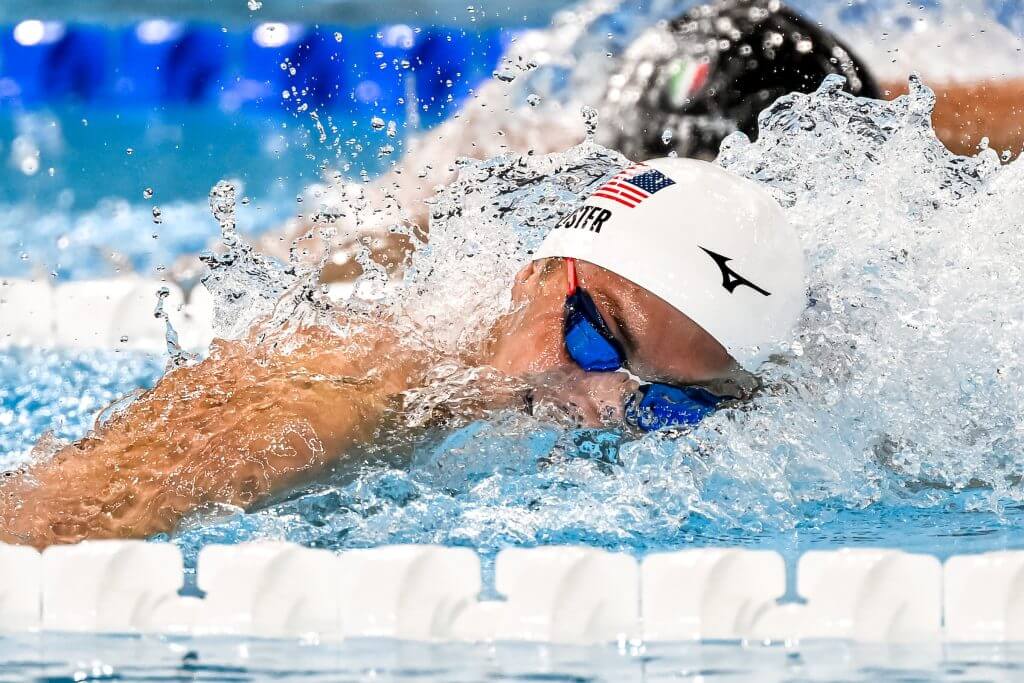Paris Olympics: U.S. Men’s 800 Free Relay Turns Tokyo Disappointment into Silver

Paris Olympics: U.S. Men’s 800 Free Relay Turns Tokyo Disappointment into Silver
At first, Drew Kibler said, it was a source of “sadness and struggle.” Eventually, it would transmute to motivation. At no point was it taboo.
Kibler and Kieran Smith swam legs of the U.S. men’s 800 free relay that did the unthinkable at the Olympics in Tokyo in 2021, finishing fourth and off the podium. Neither ever ran from the ignominy of that result. And their embrace, they said Tuesday, went a long way to rectifying it with a silver medal three years later in Paris.
“It’s something that we actually talked about a lot, since the very moment it happened,” Kibler said. “And it went from something that was, I don’t want to speak for everybody here, but it went from something that was a source of sadness and struggle to something that made us really excited.”
The journey for Kibler and Smith that culminated in silver Tuesday night at Paris La Defense Arena should emerge as one of the stories of the Games for the U.S., even if it didn’t lead to the podium’s top step. The reason for that is a historic group of British swimmers, the same four that won gold in Tokyo three years ago and the first group of four individuals to win the same relay at two different Olympics.
In Matt Richards, Duncan Scott, Tom Dean and James Guy, the Brits had three swimmers who’ve medaled in the 200 free in the last two Games. Richards won silver this week, Scott just off the podium in fourth after silver in Tokyo behind Dean. Guy’s time in prelims was a best for the veteran that would’ve placed fifth in the event. Britain won gold in Tokyo, ending a century-long relay drought for the nation, plus gold at the World Championships in Fukuoka, with the U.S. second. It was, by every measure, the Brits’ relay to lose.
They didn’t, but behind them, the U.S. men’s 800 free relay also did exactly what was needed to maximize their placing. It required a less textbook script than most relays – bronze medalist Luke Hobson; IMer Carson Foster; Smith, who finished fourth at Trials and struggled in the 400 free but has a proven track record in relays; and Kibler, who earned his way in prelims over Chris Guiliano, the other individual qualifier from U.S. Olympic Trials. Even if gold is the standard, silver was the expectation outside the bounds of the U.S. camp, and they achieved that.
“I think we’re always shooting for gold. That’s the American standard,” Kibler said. “But it is a really special thing to be on that podium. It was really tough a few years ago, missing that podium. So it’s a step forward.”
All the while, 2021’s disappointment hovered. Kibler, who swam the morning prelims and got the mid-afternoon call from the U.S. coaching staff that he would be in, let it color his drive on race day. Smith, who has consistently swum faster in the relays that his individual events, has made it a cornerstone of a storied career that added a second Olympic medal.
“I typically feel very confident jumping into the water, knowing I’m going to produce a swim that’s probably outside of my preparation level,” Smith said. “I usually overperform on that leg. So I’m proud to bring these guys home a silver medal. … Just because I can swim for my country and for something greater than myself.”
Even Hobson understands the culture. He was heading into his freshman year in Austin watching the Tokyo Olympics, with dreams of becoming an Olympian but by no means yet predestined as the heir apparent in the 200 free. From afar, he understood the significance of an American relay missing the podium. Training with Kibler only hardened that feeling by the time he made his senior international debut in 2023, and a pair of national championships for Texas in this relay underscored what it means to be a part of it.
“I could see how much of a bummer it was to not get on the medals stand,” Hobson said. “And I kind of thought to myself, yeah, I want to be there. And swimming in college with Drew, he would talk about it right after and I was like man, that really sucks. I want to make it my goal to not have that happen again, and to be able to throw down some good times that will help these boys and the U.S. get on the medal standing and ideally be in contention for a gold medal. And I think a lot of that is just motivation that has pushed me through training.”
The Longhorn flair to the U.S. men’s 800 free relay is unavoidable, with Foster, Hobson and Kibler, just another aspect of the historical understanding the quartet brings. It brought Kibler to tears when U.S. head coach Anthony Nesty, who leads Smith at Florida, tapped Kibler for the final by explaining that, “it’s a relay that has been held up by Longhorns for many years.” It’s a fitting coda to the career of coach Eddie Reese, retiring this year after so producing so many American relay stalwarts through the decades.
All of it contributes to the journey – from fourth in Tokyo to gold in Budapest in 2022 to silver in Fukuoka – that the U.S. has followed in this abbreviated quad. It’s a redemption story worthy of a place in the annals of U.S. swimming history.
“That was years in the making,” Smith said. “We’re really happy that we can get up on the stand today. I’m kind of speechless still, really proud to have another medal in my collection. And it was a really good comeback story for Drew and I.”

- EVENT PAGE
- SCHEDULE
- VENUE
- STREAMING INFO
- DAY 1 PRELIMS RESULTS
- DAY 1 FINALS RESULTS
- DAY 2 PRELIMS RESULTS
- DAY 2 FINALS RESULTS
- DAY 3 PRELIMS RESULTS
- DAY 3 FINALS RESULTS
- DAY 4 PRELIMS RESULTS
- DAY 4 FINALS RESULTS
- DAY 5 PRELIMS RESULTS
- DAY 5 FINALS RESULTS
- DAY 6 PRELIMS RESULTS
- DAY 6 FINALS RESULTS
- DAY 7 PRELIMS RESULTS
- DAY 7 FINALS RESULTS
- DAY 8 PRELIMS RESULTS
- DAY 8 FINALS RESULTS
- DAY 9 FINALS RESULTS



